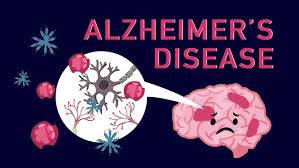Here’s a breakdown of Alzheimer’s disease, including its causes, signs, effects, and possible solutions:
Caues of Alzheimer’s Disease
While the exact cause of Alzheimer’s is not fully understood, various factors can increase the risk:
1. Genetic Factors – Family history, especially mutations in the APOE gene.
2. Age – Risk increases with age, particularly after 65.
3. Gender – Women are at higher risk than men.
4. Head Injuries – Traumatic brain injuries can raise the risk.
5. Poor Cardiovascular Health – High blood pressure, cholesterol, and diabetes increase risk.
6. Obesity – Linked with inflammation that may affect the brain.
7. Sedentary Lifestyle – Lack of physical activity is associated with increased risk.
8. Poor Diet – Diets high in sugar, saturated fats, and processed foods are linked to higher Alzheimer’s risk.
9. Smoking – Increases oxidative stress and inflammation.
10. Alcohol Abuse – Excessive drinking can damage brain cells.
11. Low Education Levels – Less mental stimulation may increase vulnerability.
12. Chronic Stress – Chronic stress and cortisol can affect brain function.
13. Lack of Social Engagement – Isolation can be a risk factor.
14. Depression – Linked to inflammation and may contribute to risk.
15. Sleep Problems – Poor sleep or sleep apnea is linked to Alzheimer’s.
16. Vitamin Deficiencies – Especially low levels of B12, folate, and D.
17. Heavy Metal Exposure – Lead and aluminum have been implicated in brain health issues.
18. Chronic Infections – Some infections may increase risk.
19. Air Pollution – Linked to cognitive decline over time.
20. Inflammation – Chronic systemic inflammation is linked to Alzheimer’s.
2. Signs of Alzheimer’s Disease
These are some early and progressive signs associated with Alzheimer’s:
1. Memory Loss – Often forgetting recent information or important dates.
2. Difficulty Planning – Trouble with organizing or managing tasks.
3. Trouble Solving Problems – Difficulty with concentration and solving routine problems.
4. Confusion About Time and Place – Losing track of dates, seasons, or time.
5. Difficulty with Familiar Tasks – Problems with daily activities, like cooking or driving.
6. Misplacing Items – Frequently losing things or placing them in odd places.
7. Poor Judgment – Poor decision-making, such as financial errors.
8. Withdrawal from Social Activities – Disinterest in hobbies or socializing.
9. Changes in Personality – Mood swings, irritability, or increased anxiety.
10. Difficulty Understanding Visual Images – Problems with depth perception or reading.
11. Language Problems – Struggling to find the right words or following conversations.
12. Repetition – Repeating questions, phrases, or stories.
13. Mood Changes – Becoming anxious, depressed, or fearful.
14. Apathy – Loss of interest in things they once enjoyed.
15. Poor Spatial Awareness – Difficulty recognizing familiar places or objects.
16. Loss of Initiative – Reduced motivation to engage in tasks.
17. Agitation or Aggression – Increased frustration or angry outbursts.
18. Sleep Disturbances – Restlessness at night or reversal of day and night.
19. Suspicion – Becoming paranoid or suspicious of others.
20. Difficulty Managing Finances – Issues with bills, money handling, or budgeting.
3. Effects of Alzheimer’s Disease
Alzheimer’s can lead to various effects on an individual’s life and health:
1. Loss of Independence – Needing help with daily tasks and personal care.
2. Reduced Quality of Life – Decline in overall physical and mental well-being.
3. Communication Challenges – Trouble with speaking, writing, or understanding.
4. Behavioral Changes – Increased agitation, aggression, and mood swings.
5. Increased Risk of Falls – Due to poor coordination and mobility.
6. Physical Health Decline – Weight loss, frailty, and susceptibility to infections.
7. Social Isolation – Withdrawal from family, friends, and social interactions.
8. Financial Strain – Cost of long-term care and medical expenses.
9. Caregiver Burden – High emotional, financial, and physical strain on caregivers.
10. Shortened Lifespan – Progressive nature of the disease often reduces life expectancy.
4. Solutions and Management
While there is currently no cure for Alzheimer’s, there are strategies to manage symptoms and improve quality of life:
1. Medication – Cholinesterase inhibitors (e.g., Donepezil) and memantine can help manage symptoms.
2. Cognitive Therapy – Activities that engage the brain can slow cognitive decline.
3. Healthy Diet – A balanced diet rich in antioxidants and omega-3s can support brain health.
4. Physical Exercise – Regular physical activity improves blood flow and cognitive function.
5. Mental Stimulation – Puzzles, reading, and learning new skills help keep the brain active.
6. Sleep Improvement – Prioritizing good sleep habits is crucial for brain health.
7. Social Interaction – Staying socially active helps with mental and emotional well-being.
8. Occupational Therapy – Can improve daily function and independence.
9. Creating a Safe Environment – Reducing hazards at home to prevent falls and accidents.
10. Caregiver Support – Support groups and respite care can help caregivers manage stress and prevent burnout.


